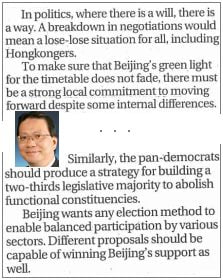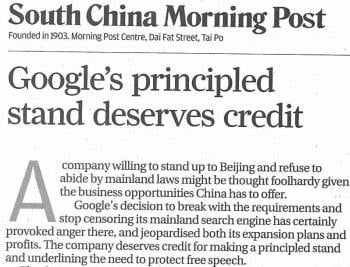I still get only a choice of English or traditional Chinese on google.com.hk – a page I visit dozens upon dozens of times a day – but apparently a simplified character version appears on the other side of the border, where mainland web users now have no other choice if they want to use what is by a million miles the best search engine going. (One of modern life’s most irritating frustrations: wanting to check something quickly on a public PC and finding some benighted wretch has set Yahoo or Bing as the default.) Unlike us in Hong Kong, of course, people on the mainland using ‘our’ Google have the PRC firewall filtering out prohibited sites.
The South China Morning Post, controlled by the patriotic Robert Kuok’s Kerry Group, asserts its editorial independence today with a bold defence of Google’s decision to more or less tell China’s communist rulers to do their own dirty work rather than self-censor:
The correct party line, which the SCMP pretty much ignores, is that Google is utterly wrong and incorrect and abandoning its cheese (don’t ask) and indulging in a civilizational conflict at the behest of information-imperialists, not to mention in a publicity stunt that will only benefit rival Baidu, essentially a children’s search engine that Forbes has promptly told investors is a sell. (For the youthful among us who need to rummage around for hard-to-find files of, shall we say, a terpsichorean nature – of the sort Google does not highlight – I recommend Sogou.)
Essentially, Google has moved to humiliate Beijing in the eyes of China’s more sophisticated net-using citizens. The company hasn’t gone the whole way by pulling the plug on Google Earth and other features these people would sorely miss, but it has implicitly threatened to provoke resentment against the authorities by doing so. The leaders in Beijing have never come across a company or government that essentially says “We’re not that fussed about the money,” and they are outraged. To them, an entity that isn’t mesmerized by the lure of profit in China is a thing to be feared.
If the SCMP editors find this inspiring, they are quick to pull themselves together and redress the balance with an op-ed article by Professor the Hon Anthony Cheung Bing-leung GBS JP, Executive Council member, President of the Hong Kong Institute of Education and founder of low-key sort-of-think-tank-thing SynergyNet. He presents the Big Lychee government’s official line – which is to say, the CCP’s directive translated into local bureaucrat-speak – on political reform.
This is a line rooted in a deception and fantasy that much of Hong Kong seems close to swallowing. According to this pretence, the People’s Republic of China – a one-party state – will allow the people of Hong Kong to choose their own executive and legislative branches of government, through free and fair elections, within the next 10 years or so. Conditions, such as the need for the process to be gradual and orderly, are attached but vague and generally downplayed. The key, we are now being told by people like Professor Cheung, is forging a compromise between conflicting local forces, essentially the minority who currently hold power and everyone else.
A simple look at the electoral reform package offered for 2007-08 (vetoed by pro-democratic lawmakers) and essentially repeated this time round for 2012 shows that something very different is really happening. There is no intention whatsoever to reform; Hong Kong is currently run by a small group of tycoon-influenced bureaucrats answerable to the Chinese government, and the cosmetic changes being proposed will not alter that one iota.
 So, for example, Cheung must know that asking the pro-democrats to work on building the two-thirds legislative majority necessary to abolish functional constituencies is a snare – an invitation to get absorbed into a time-wasting dead-end.
So, for example, Cheung must know that asking the pro-democrats to work on building the two-thirds legislative majority necessary to abolish functional constituencies is a snare – an invitation to get absorbed into a time-wasting dead-end.
The FCs exist to ensure that Beijing can control the legislature. The decision to abolish them can come only from Beijing. They will dissolve themselves if Beijing tells them to, otherwise they won’t. Pro-democrats don’t come into it (any more than the FCs themselves do, or the Hong Kong administration).
Cheung half admits this when he says that the Chinese government insists on “balanced participation by various sectors”. This is code for “being allowed to rig the election”. A Communist Party will always, always rig any election. It must. It has no choice. The country ceases to be a one-party state otherwise. Our best hope, if we are sick of Hong Kong being run on behalf of half a dozen property tycoons’ families, is that Beijing chooses a different and less malignant way of rigging things. Since it doesn’t address this, the political reform debate is a farce.
Why Cheung should lend himself to all this disingenuousness is anyone’s guess. His fellow token moderate democrat on Exco, Anna Wu, manages to mostly steer clear of it (though her columnist husband Frank Ching partly compensates in his SCMP articles). He is a public-sector guy through and through, so it’s not as if he’s having multibillion-dollar construction projects dangled before him. Perhaps someone has an embarrassing photo of him in a Shenzhen hotel room? Or has he fallen under the spell of an upgrade from Gold Bauhinia Star to Grand Bauhinia Medal?
Thank God he doesn’t run a search engine.


The PRC is still more democratic than the US of A and has had universal health care for sixty years. For example. Different doesn’t always mean worse. Democratic doesn’t mean better. Start thinking originally. Your pro-Western propaganda is wearisome.
Good point. As a token of my democratic principles, the next time I need invasive surgery I’ll book the operating theatre at Guangzhou Public Hospital Number 7 and let one of those barefoot doctors have at me.
I read recently that a Chinese surgeon stepped out in the middle of surgery and told the patient’s family that they had better go and buy some anaesthetic pretty quickly because his supply had run out. Yipes!
Do people genuinely believe that there can ever be full democracy in HK or is it an article of faith for a certain class? Is it what gets them elected? Would Frank Ching have nothing to write about otherwise? Are these people unintelligent or just ignorant? Anything short of a bloody coup won’t do it.
In my experience the PRC’s health care system is about as universal as the USA’s.
I’ve had family members treated in both countries (a broken hip in the US and an achilles tendon in the PRC). In both cases treatment seemed to be contingent on having the cash. This contrasts with my own country (and I’m sure it can’t be alone in this), where it doesn’t matter if you have nothing, you get treated if you need it.
Imagine this dream – the 21st centuries superpowers competed not on military dominance, but on the quality of health care and other benefits their citizens enjoyed.
Now wake up.
Good point. It’s outrageous that one is expected to pay for one’s own medical treatment!
I have a friend in Shanghai who had cerebral haemorrhage in the middle of the night and the doctors at the hospital refused treatment until his girlfriend got hold of another lauwai that signed all papers and got his credit card out.
What the national healthcare system has to do with democracy I still don’t know.
PRC has universal healthcare ????
Not when I was living there and needed stitches in my left hand that was badly cut.
First someone had to go to the cashier and pay the bill in advance, before I received any treatment. I could have bled to death, sort of.
@Sam;
You are totally right. It is outrageous that one would be denied essential health care if one couldn’t stump up the cash! While I’m all for user pays principles in some applications, the reality is that a healthy population (including poor people) benefits an entire society. So if the whole community benefits, why shouldn’t the whole community share the cost via taxation/public health insurance?
Without an ample supply of poor people who are in fit condition to work; labour costs will constrain the capacity of our economy! And at the end of the day, does anything else really matter…?
Some might argue that we should rely on survival of the fittest (richest, whatever) and let the bastards die in the gutters. I would argue cooperative teamwork and the formation of compassionate societies is also a factor in evolutionary success. In short, I say people who lack reasonable compassion are in fact weakening the competitiveness of the societies they are a part of.
I’d suggest we have them all neutered, but that would display a lack of compassion on my part… *gulp*
haha